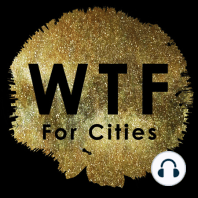10 min listen

077R_Steering into the Skid – Arbitraging human and artificial intelligences to augment the design process (research summary)
077R_Steering into the Skid – Arbitraging human and artificial intelligences to augment the design process (research summary)
ratings:
Length:
12 minutes
Released:
Sep 5, 2022
Format:
Podcast episode
Description
Summary of the article titled Steering into the Skid – Arbitraging human and artificial intelligences to augment the design process from 2020 by Geoff Kimm and Mark Burry, presented at the 40th Annual Conference of The Association for Computer Aided Design in Architecture and published in their proceedings Volume 1: Technical papers, keynote conversations.
Since we are investigating the future of cities, I thought it would be interesting to see how artificial intelligence can be noted as an ally instead of a risk, at least in the design processes. This article investigates how can architects arbitrage an ever-changing gap between maturing AI and mutable social expectations.
You can find the article through this link.
Abstract: What if any perceived risks of lost authorship and artistic control posed by a wholesale embrace of artificial intelligence by the architectural profession were instead opportunities? AI’s potential to automate design has been pursued for over 50 years, yet aspirations of early researchers are not fully realized. Nonetheless, AI’s advances continue to be rapid; it is an increasingly viable adjunct to architectural practice, and there are fundamental reasons for why the perceived “risks” of AI cannot be dismissed lightly. Architects’ professional role at the intersection of social issues and technology, however, may allow them to avoid the obsolescence faced by other roles. To do this, we propose architects responsively arbitrage an ever-changing gap between maturing AI and mutable social expectations—arbitrage in the sense of seeking to exercise individual judgment to negotiate between diverse considerations and capacities for mutual advantage. Rather than feel threatened, evolving architectural practice can augment an expanded design process to generate and embed new subtleties and expectations that society may judge contemporary AI alone as being unable to achieve. Although there can be no road map to the future of AI in architecture, historical misevaluations of machines and our own human capabilities inhibit the intertwined, synergistic, and symbiotic union with AI needed to avoid a zero-sum confrontation. To act myopically, defensively, or not at all risks straitjacketing future definitions of what it means to be an architect, designer, or even a professionally unaligned creative and productive human being.
You can find the transcript through this link.
What wast the most interesting part for you? What questions did arise for you? Let me know on twitter @WTF4Cities!
I hope this was an interesting episode for you and thanks for tuning in.
Music by Lesfm from Pixabay
Since we are investigating the future of cities, I thought it would be interesting to see how artificial intelligence can be noted as an ally instead of a risk, at least in the design processes. This article investigates how can architects arbitrage an ever-changing gap between maturing AI and mutable social expectations.
You can find the article through this link.
Abstract: What if any perceived risks of lost authorship and artistic control posed by a wholesale embrace of artificial intelligence by the architectural profession were instead opportunities? AI’s potential to automate design has been pursued for over 50 years, yet aspirations of early researchers are not fully realized. Nonetheless, AI’s advances continue to be rapid; it is an increasingly viable adjunct to architectural practice, and there are fundamental reasons for why the perceived “risks” of AI cannot be dismissed lightly. Architects’ professional role at the intersection of social issues and technology, however, may allow them to avoid the obsolescence faced by other roles. To do this, we propose architects responsively arbitrage an ever-changing gap between maturing AI and mutable social expectations—arbitrage in the sense of seeking to exercise individual judgment to negotiate between diverse considerations and capacities for mutual advantage. Rather than feel threatened, evolving architectural practice can augment an expanded design process to generate and embed new subtleties and expectations that society may judge contemporary AI alone as being unable to achieve. Although there can be no road map to the future of AI in architecture, historical misevaluations of machines and our own human capabilities inhibit the intertwined, synergistic, and symbiotic union with AI needed to avoid a zero-sum confrontation. To act myopically, defensively, or not at all risks straitjacketing future definitions of what it means to be an architect, designer, or even a professionally unaligned creative and productive human being.
You can find the transcript through this link.
What wast the most interesting part for you? What questions did arise for you? Let me know on twitter @WTF4Cities!
I hope this was an interesting episode for you and thanks for tuning in.
Music by Lesfm from Pixabay
Released:
Sep 5, 2022
Format:
Podcast episode
Titles in the series (100)
008R_What are the differences between sustainable and smart cities? (research summary) by What is The Future for Cities?